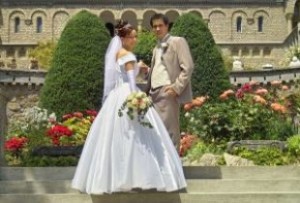Traditional Italian Weddings and How To Survive Them
Posted on December 9th, 2013 by Anna in Uncategorized | No Comments »
We all know the iconic opening scene to The Godfather: a lavish wedding reception where Talia Shire surrounded by legions of extended family members all singing, dancing, eating, and drinking. But is that an accurate portrayal of an Italian wedding? If you are invited to one, what can you expect to happen?
First of all, Italian weddings—like much of their culture—is steeped in tradition, so many rules are followed that date back generations. As much of Italian life, especially outside of big cities, is still very religious, marriages can often last all day, beginning with a mass at the local church, followed by the wedding ceremony, or sposalizio, which is performed by the priest. Afterwards comes the reception, a celebration with friends and relatives that may last all night and into the morning.
As in most western weddings, the bride will generally wear a white gown, (although in the past it was traditional for her to wear a black dress and a white hat,) and it is considered very rude to wear white if you’re a guest to the wedding. Rather, play it safe and dress in black, which is considered very chic in current Italian fashion.
Another crucial tradition to know before you attend an Italian wedding is that, in lieu of gifts, it is customary to make a donation to the wedding. Often this will be done in exchange for pieces of the bride’s tossed garter belt, or the groom’s tie. Other times, money will be given to the bride in exchange for a chance to dance with her, and then the bride’s grandmother will guard the stash of donations. Otherwise you can just give the money in an envelope to the hosts of the wedding; it is good form to pay around $100-$150, depending on how extravagant the wedding is, how well you know the bride and groom, and how much you can afford.
As with all Italian celebrations, a wedding is filled with good wine and gourmet food for all. Sweet liquors and other alcoholic drinks will be served to guests before the reception by the best man. If you don’t wish to drink, make sure to state your case firmly, because for the rest of the night people will be toasting the newlyweds with wine and any other drink in hand. If you wish to make a toast yourself, the most common one is, “Evviva gli sposi!” meaning, “Long live the newlyweds!” to which it is then seemly for everyone in the room to applaud wildly. Another popular toast is, “Per Cent’Anni!” meaning, “For a hundred years!” which suggests the hope that the newlyweds may live so long in happiness together.
Of course, to truly get the most out of an Italian wedding, whether it be in elaborate toasts or meeting the relatives, your best bet is to learn some Italian in preparation. Make an enquiry with us, or check out our listing of language courses to enroll an Italian class as soon as possible.






